A Vineyard Gazette online survey soliciting thoughts and plans about the upcoming summer on Martha’s Vineyard tapped a torrent of health worries and confusion over how or even whether the Island is preparing to reopen. More than 4,900 people responded in just three days before the survey was closed.
A total of 78 per cent of those who filled out the survey said they were very or moderately concerned about their personal health in light of the coronavirus pandemic. Nine per cent of all respondents said they would not be coming to the Vineyard at all this summer and 12 per cent more said they would spend less time on-Island than usual. And 15 per cent of seasonal homeowners and 38 per cent of summer renters said they were still undecided about whether to visit the Island at all.
“We would love to come if allowed, but it seems unclear what the guidance is right now even for property owners,” said one seasonal homeowner. “We want to be able to come and support the local businesses we love on the Island, even with take-out and curbside pickup, but don’t know if it will be allowed or welcome.”
Survey results painted a broad picture of people planning for a quieter-than-normal summer, with a majority eager to enjoy the outdoors and willing to shop and eat out if strict safety protocols are in place. Suggestions for what could be done to improve the summer experience included better public education, requiring and enforcing masks and social distancing, opening up outdoor dining, closing downtown streets to traffic, limiting day-trippers and instituting widespread Covid-19 testing.
The nine-question survey was launched on Tuesday, May 5 and an email was sent to subscribers of the Vineyard Gazette and its newsletters on May 6. It was closed Friday, May 8, after 4,901 people had filled it out. All responses were anonymous. While the huge number of responses provides insight into general attitudes, the survey results do not represent a scientific sample.
Of those responding, 1,278 people, or 26 per cent, identified themselves as full-time Island residents. Another 1,696, or 35 per cent, were seasonal homeowners and 1,750, or 36 per cent, said they were summer renters. Four per cent, or 178 people, were occasional visitors or did not answer.
Homeowners and older people were heavily represented. Nearly 3,000 people, or 61 per cent of respondents, said they owned homes on the Vineyard. Fifty-three per cent said they are over 60 years of age.
Responses and comments revealed a wide spectrum of views about what has been done, what is likely and what should be done about opening the Island to seasonal homeowners, longtime renters and other visitors, though there were several recurrent themes.
Hundreds of respondents expressed frustration about poor or inadequate communication about the Island’s plans. Many others decried what they perceived as an inhospitable attitude toward people who don’t live full-time on the Island.
“Call me naive, but I never realized how unwelcome summer visitors are to so many Islanders,” said one respondent.
“While I understand the real and legitimate concerns during this public health crisis, apparently there’s an ugly, underlying hostility that has changed the way I feel about MVY. I would strongly suggest a change of tone when discussing the dilemma we ALL face this summer.”
In a common response to a question about what should be done, one full-time resident offered this succinct prescription: “Clear, consistent, and widely broadcasted guidelines from local leadership in a unified regional message advising visitors on risks and recommended safety precautions.”
Health, Safety Concerns
A large majority of all respondents expressed concern for their personal health, with Island residents somewhat more worried than others.
Overall, 45 per cent of respondents said they were very concerned about their health and 33 per cent said they were moderately concerned. A total of 211 people, or 4 per cent, said they were not concerned. By comparison, 51 per cent of Islanders said they were very concerned about their personal health and another 33 per cent said they were moderately concerned. Three per cent, or 42 people, said they were not concerned.
“My biggest concern is my age (79) and the lack of sufficient medical resources on the Island,” said one respondent.
Respondents in general expressed worry about crowds and about people not aware or not following basic safety precautions. Several renters wondered whether disinfection protocols would be enforced to guard against the risk of infection.
Many respondents suggested their fears could be managed if the Island continued to stick with strict protocols for social distancing and mask-wearing and instituted other safety measures. There were numerous suggestions for signage and other reminders of ways to protect public health. Dozens called for universal testing for Covid-19. Several people suggested placing hand sanitizers in public places around the Island.
“Make sure that people understand the need to quarantine and follow the rest of the public health guidelines. They only work when followed. We do not want to be sitting ducks for anyone arriving and behaving in a way that is not consistent with recommendations,” said one resident.
One person itemized three steps the Island could take to reassure visitors: “1. Ensure that PPE (personal protective equipment) is available for purchase on the Island. 2. Owners must leave products in house that support cleaning surfaces to make renters feel safe. 3. Ensure restaurants can provide safe dining (distancing).”
Others were focused on the Steamship Authority, calling for clearer sanitation protocols to minimize the risks of traveling on crowded ferries.
Of those who are on the fence or have decided not to visit the Island this summer, worries about health were major factors. Fifty-three per cent of people who are not coming said they were worried about risks of travel in general, 40 per cent were concerned for their own health and a third were worried about the health of a family member.
“I would love to be on the Vineyard this summer just relaxing and enjoying the quietness of the island. However, while I am not concerned about the canceled events, I would be concerned with beach closure and/or not taking social distancing seriously if the beaches were open. More importantly is the uncertainty of a rental that wasn’t sterilized appropriately against the virus,” said one regular visitor who will not come.
“My decision not to visit MV this summer is simply out of vigilance for public health. I don’t want to overwhelm the Vineyard’s limited health facilities should I require medical attention during my stay, so I will stay home,” said another.
Commerce and Entertainment
Responses to the survey offered a mixed message to Island businesses. Just over half of full-time Island residents said they were very or moderately concerned about their ability to earn a living this summer. Several noted a need for additional resources for Islanders who have suffered financial hardship as a result of the pandemic.
“The Island as a whole needs a coordinated plan for businesses to move toward a no or little-contact operation for those that can do it,” one respondent suggested. “Grocery stores should limit the number of people inside, the hospital should figure out how to ramp up capacity, the ferries should run very early and very late boats so people can drive off peak and avoid crowds at rest stops. There could perhaps be a way to do more grocery or farm stand or liquor store delivery or boxes for people to stock houses with perishables upon arrival so families can quarantine and keep Islanders safe.”
Sixty-one per cent of survey-takers said they would be unlikely to go to restaurants or bars, but a larger majority (83 per cent) said they would be somewhat or very likely to order takeout. Well over 100 people suggested ways that restaurants could accommodate by offering outdoor dining, delivery services and curbside pickup.
Almost two-thirds of respondents (63 per cent) said they would be very likely or somewhat likely to shop in Island stores, but many qualified their responses, saying they would only shop for groceries and other necessities.
Eighty-five per cent said they would be likely or somewhat likely to visit farm stands or outdoor markets.
Concerns about the food chain and the potential for crowding at the Island’s few grocery stores loomed large in comments.
“I am very worried about food shortages,” said one person. “I would hope that enough is done to ensure that there is enough food to buy at the supermarkets, through the restaurants, local farms etc. “
A number of people suggested they would happily to pay to have food and other necessities delivered to their homes.
“Putting unemployed or under employed folks to work shopping for groceries and supplies would benefit them as well as those of us who are over 65 who would utilize their services,” suggested one respondent.
Most of the Island’s signature summer events have already been canceled, but nine out of 10 survey respondents said they would be unlikely to attend gatherings of 25 or more people. Several said they would make exceptions for outdoor events, with scattered calls for outdoor movies and concerts with appropriate social distancing.
“Have creative, new approaches that feel FUN, such as closing the streets in Edgartown to allow outdoor restaurant seating, setting up drive-in movies, having a socially distant street fair by the shops on Main Street in Vineyard Haven, or having more bike excursions,” one person offered.
“Organized, Covid-friendly outdoor inspirational weekly activity, perhaps to raise money for a great cause or displaced workers. These could be weekly #vineyardstrong events where we can contribute to a fund, encourage first responders, encourage one another or help people who need help,” said another.
About three-quarters of respondents also said they would also be unlikely to get together in gatherings of 10 or more, though an equal number said they would be comfortable socializing with a few friends.
Beaches, Outdoor Recreation
A large majority of respondents said they were very or somewhat likely to go to the beach and engage in other outdoor activities this summer.
About 3,200 of those responding to the survey said they were “very likely” to go to beach, walk on trails or bike. Another 750 said they were “somewhat likely” to do so.
In comments, however, there were worries about the beaches being closed and the potential for overcrowding. Some expressed fear of overregulation, saying people should be trusted to be responsible about social distancing.
“Tell people that the beaches will be open for the summer. Stop being negative,” said one respondent.
Suggestions ranged from restricting parking, as has been done at Lucy Vincent, Lambert’s Cove and Moshup Trail beaches, to limiting the number of people allowed at one time on public beaches to opening all beaches up to the public.
“Control public beaches and trails to maintain social distance guidelines, perhaps by timed entry and maximum time you can stay,” said one respondent.
“All the towns might have to work together to fund seasonal positions for beach enforcement this summer: parking, traffic direction, social distancing — positions that go beyond lifeguards,” offered another.
Quest for Clarity
Survey results revealed widespread confusion over whether visitors, including seasonal homeowners, would be welcome on the Island, when and under what conditions. Massachusetts Gov. Charlie Baker has issued a stay-at-home advisory that expires Monday, May 18, and all six Island towns are under stricter stay-at-home orders until that date.
The governor has said the state would reopen in four phases, but has not defined what types of activity would be included in each phase nor when each would take effect. He said his plans would be influenced by a report from a 17-member advisory panel, which is scheduled to release its recommendations by Monday. For the most part, the Island towns are awaiting the governor’s lead.
But respondents said they need more information, even if incomplete, in order to make plans. And many were unclear whether past guidance from the hospital asking non-residents to self-quarantine for 14 days after arrival would remain in effect.
Of the 1,519 people who said they were either not coming or undecided about coming to the Vineyard this summer, 27 per cent said they were confused about the guidelines for visiting.
“I look forward to visiting for a few weeks, as my family has done for over 20 years, but I’m very concerned about a possible 14-day quarantine,” said one summer visitor. “This would essentially have us confined for the duration of our vacation, and we would likely be forced to cancel. We are desperate for information about whether this will be the case.”
In comment after comment, respondents used the words “clear” and “consistent” to describe the kind of communication they need from the Island. Many people noted the need for a broad public education campaign targeted at anyone who plans to visit the Island, to be provided when booking ferry, bus, or plane reservations.
“We need clear instructions on what is expected from everyone (summer visitor and yearlong residents) as it pertains to health precautions related to the virus, i.e., wearing of masks, social distancing, etc.,” said a typical comment.
One respondent suggested that the Steamship Authority could launch a “healthy operations” campaign.
“Use the website, email past travelers if possible, a few social media posts, perhaps a 60-second video,” the respondent wrote. “Collectively, the message should be that our job is to get you safely to the Vineyard and back and here’s what we’re doing. Just run down the infection-control procedures, and point out that the Vineyard has had very few cases. That would certainly help folks who are on the fence about their summer plans feel more comfortable.”
Many seasonal homeowners and summer renters expressed dismay at what they see as hostility from full-time Islanders. Twenty-two per cent of those who are either thinking of or have decided not to visit said they did not feel welcome.
Respondents cited comments on social media and in newspaper websites, and noted the tone in some communications from the Island seemed unfriendly. Several people said they had been harassed on the Island driving cars with out-of-state license plates.
“The rhetoric on the Island these past months has been so toxic, if visitors are paying attention they would think twice about visiting,” said one respondent.
“It has been very sad to see the dialogue regarding full-time residents vs. seasonal residents. Of course, there was a fear initially about people coming from highly infected areas, but the conversation should have focused on ALL people staying where they were to limit the spread, not who is “entitled” to the services on MV,” another said.
Hundreds of commenters, including many identifying themselves as full-time Islanders, called for civility and compassion as the Island moves into the summer.
“Acknowledge that this will be a unique year with a unique situation,” said one. “Don’t try to force the summer to be the way it has been. Embrace the quieter ways and clearly communicate an island philosophy and/or plan to set expectations and social norms appropriately.”
Louisa Hufstader assisted with research.


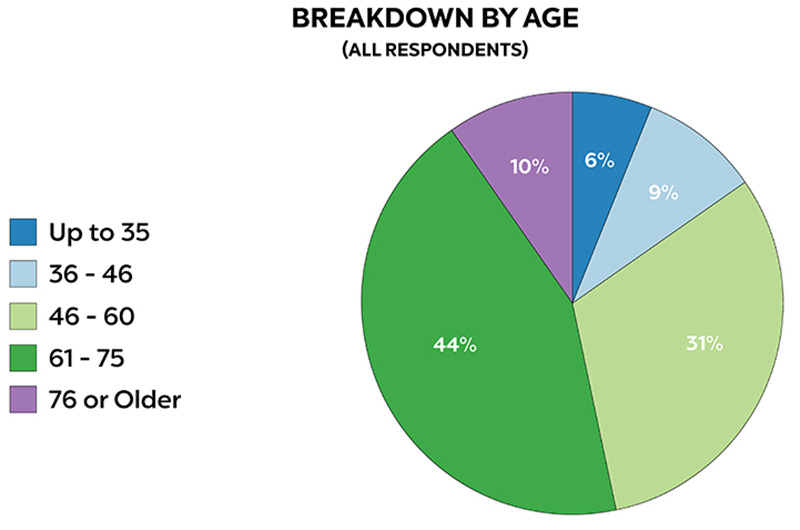
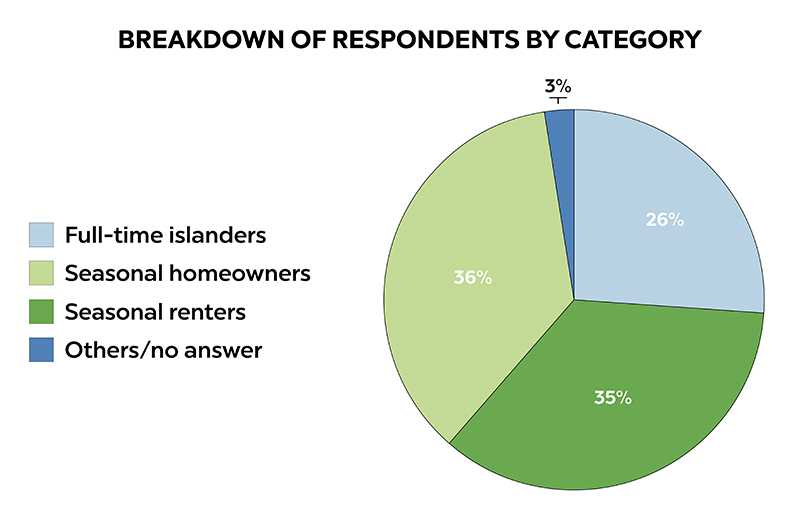
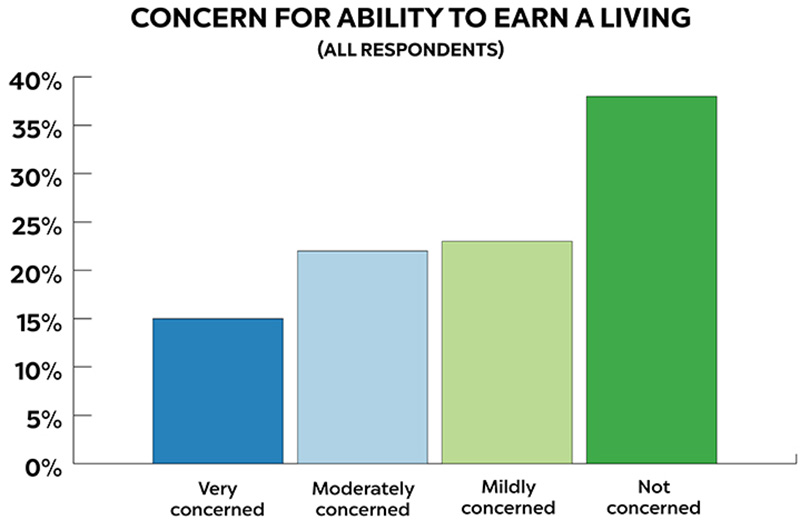
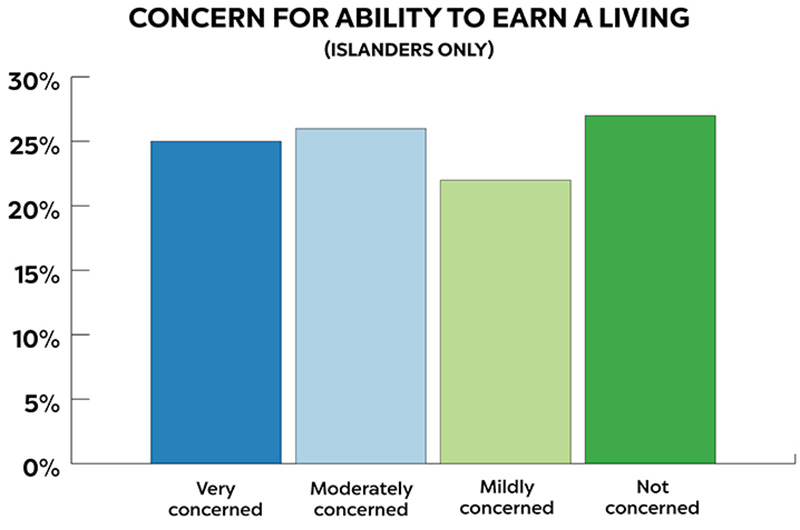
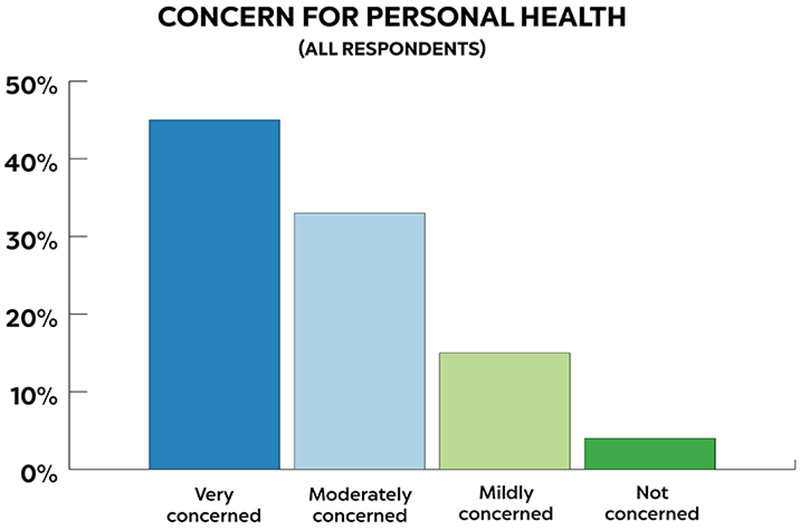
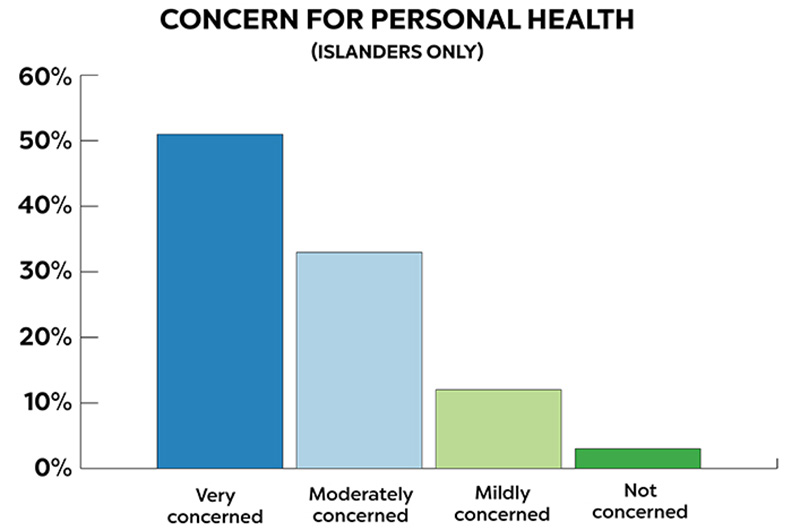


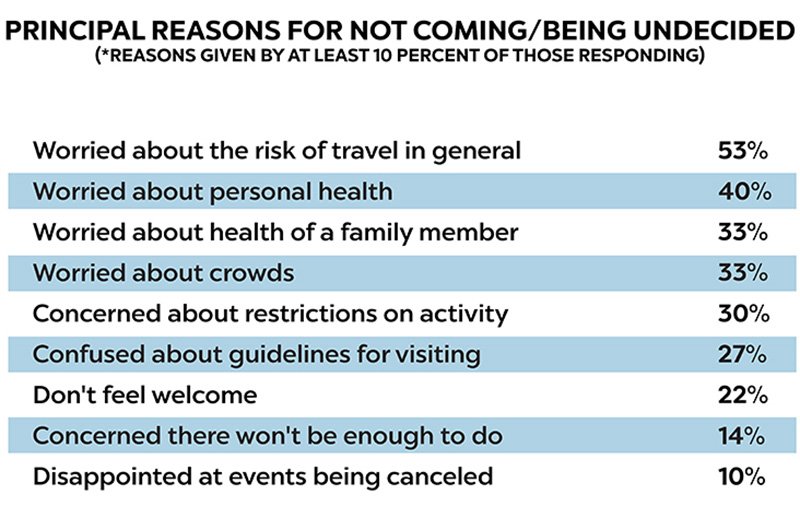





Comments (24)
Comments
Comment policy »